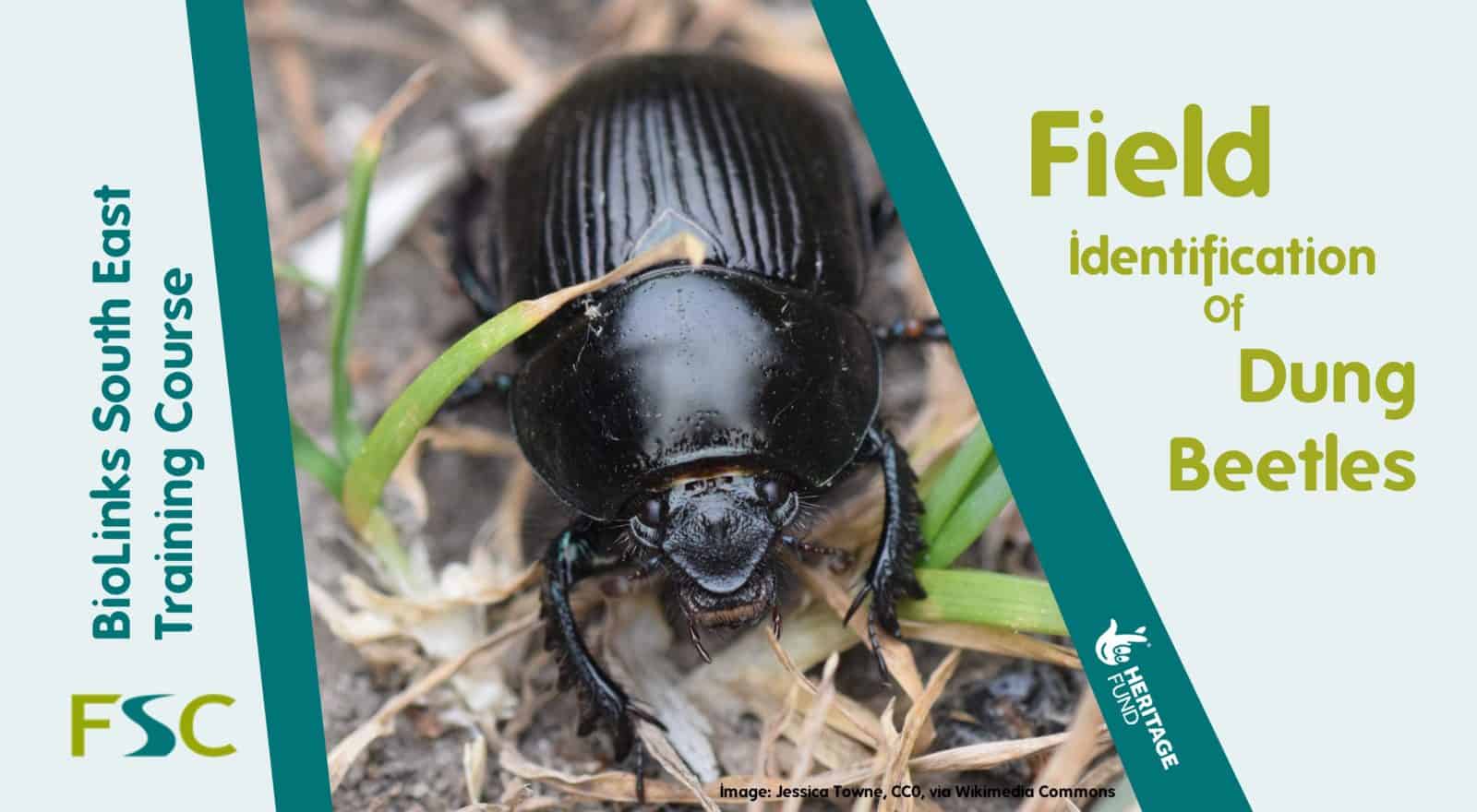Dung beetles are not a single taxonomic group, with dung beetles found in at least two beetle families. There are approximately 60 species of dung beetle across 39 genera found in the UK. This course will introduce you to the world of dung beetles with instruction on how to find, collect, and identify them in the field.
This course provides an introduction to identifying dung beetles that can be readily found in the field. This includes a short presentation introducing the morphological features used to identify specimens, followed by practical sessions guided by our expert tutor. During the field sessions, you will find, trap, and explore a variety of different dung beetle species.
Through a combination of taught classroom content and field-based practical sessions, learners will gain confidence in distinguishing dung beetles from other similar groups and identification of dung beetle specimens to genus or species level.
- Certificate upon course completion.
- Please email [email protected] if you have any questions.
- Please note that this course will involve using specimens that have been killed and preserved.
This course is aimed at adults only and course attendees must be at least 18 years old in order to attend.
What will be covered during this course?
- The external (morphological) features used in dung beetle identification.
- How to safely search for dung beetles in horse manure and other mammal droppings.
- Practical experience setting dung beetle traps.
- Please note that attendees will handle dung and beetles that have recently been in dung. Gloves and hand sanitiser will be provided.
See the ‘Example Timetable’, ‘What’s Included’ and ‘Before You Attend’ sections below for more information about this course.
Course Fees
Regular Price: £75 For professionals and residents outside of the UK. Select ‘Attendee: In Person’ Sold Out
Subsidised Price: £10 Subsidised by the FSC BioLinks project for non-professionals eg. volunteers, biological recorders, wildlife gardeners, amateur naturalists and students. Available to UK residents only. Select ‘Attendee Subsidised: In Person’
Tutor: Mary-Emma Hermand
Mary-Emma Hermand is a consultant entomologist with a fondness for dung beetles, particularly their taxonomy and morphology. Founded during an industrial placement year at the Oxford University Museum of Natural History under the guidance of Darren Mann, the National Recording Scheme Organiser for Scarabaeoidea (dung beetles, chafers and their allies), her interest in dung beetles lead her to complete a MSc in Entomology by Research where she studied the morphology and ecology of two cryptic dung beetle species in depth. When not behind a microscope or rummaging through museum insect collections, Mary-Emma enjoys engaging the general public with wildlife from volunteering as an environmental educator with her local Wildlife Trust to leading ID workshops with the FSC.
Covid Measures
In order to keep our customers and staff safe we ask that anyone attending our centres:
- wears a face covering when in shared indoor space (unless exempt).
- maintains social distancing.
- cleans their hands regularly.
- takes a Covid-19 test before they arrive.
Example Timetable
- Please arrive in time for the course to start promptly at 10:00 am.
- Refreshments will be available from 9.45 am.
- The course will end at 4:00 pm.
What's Included
- 6 hours of tuition.
- Certificate of attendance.
- Access to an expert tutor, identification resources and field equipment.
Bursaries and Subsidies
FSC BioLinks
FSC BioLinks is an exciting project for FSC in the South East and West Midlands, bringing together existing volunteers with skills in biological recording and identification, and new volunteers.
This project provides subsidised training courses, learning opportunities and digital tools focussed on invertebrate identification for anyone involved or interested in biological recording, to build and strengthen the community.
Invertebrates provide us with many useful ecosystem services, like pollination and decomposition, which we cannot survive without but their numbers are declining. Few people know how to identify or record invertebrates meaning there is a lack of data.
We are delighted to have been awarded a grant of £1.23 million from the National Lottery Heritage Fund for this project.
Before You Attend
Getting to FSC London: Bushy Park
Information on getting to the site can be found here.
When you arrive at The Stockyard gate you may need to call the centre to open the gate. You can reach the staff on site on 020 8941 4398.
Due to the outside nature of part of this course, participants are advised to bring suitable clothing and footwear in order to access the Bushy Park site in various weather conditions.
This BioLinks course has aspects that will be taught outdoors with walking to field sites over uneven ground. No special preparation is required providing you are used to gentle exercise. If you have any concerns or questions about access or the activities involved, please get in touch.
What to bring
- Notebook and pencil
- Lunch
- Any specimens that you'd like verified (tutor availability during the course permitting)
Please note that this course will involve using specimens that have been killed and preserved.
There will be a member of staff with first aid training and access to a first aid kit on site. If you have special medical requirements please let us know as soon as possible so we can plan the course.
Sorry this course has ended

